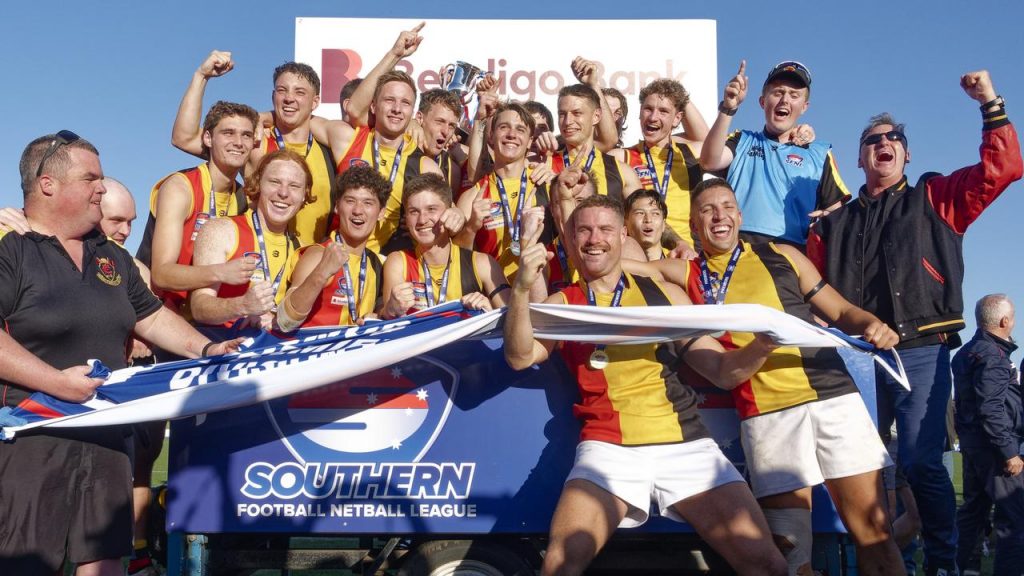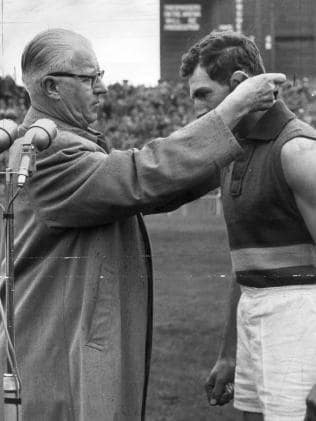History
Known as the Rosellas, the early Cheltenham Football Club sides began playing on a regular basis in 1890, and would travel long distances by steam train to play country teams, such as Ballarat where they would arrive at their destination, play the match, socialise then return to the station. Opposition players and supporters would give three hearty cheers on their departure.
The Cheltenham home games were played on a paddock on the corner of Park and Charman roads in Cheltenham. In 1907 the Cheltenham progress committee made an application to the board of land works for land in Weatherall Road for recreational service to the public. That application was received and granted, then developed where Cheltenham Recreational Reserve now stands.
The land in the early days was virgin bush and the response for voluntary help to clear the area was outstanding. Nearly all the market gardeners in the district along with horses, ploughs, axes, shovels completely cleared the area in three weeks. The Moorabbin council then levelled the playing area and erected a post and rail fence around the ground. Pine tree shrubs were then planted on the west side of the ground.
The ground was opened in 1909 and the first Cheltenham side entered in the newly formed Federal Football Association along with seven other foundation members, Mordialloc, Mentone, Moorabbin, Frankston, Glenhuntly, Elsternwick, and Ellindale. The grand final for that year, 1909 was a hard encounter between Cheltenham and Ellindale with Cheltenham coming out victors, thus becoming the inaugural Federal Football Association premiers.

Cheltenham went onto win five senior premierships in the Federal Football Association by the end of the 1920s, they won the flags in 1909, 1911, 1913, 1922 and 1925, with the late Percy Woff playing in all 5 premiership sides and was captain in 1922. 1928 saw the start of an outstanding career from our oldest living player Tom Connor.
There were many great players for Cheltenham in the 1930s and Tom Butler was one of the finest, playing over 400 in a career that spanned over 20 years. Cheltenham continued to win premierships in the 1920’s and 1930’s with juniors taking out the 1929 and 1933 flags, under the guidance of Woff, and that continued in 1934 when Cheltenham took out the 1st XVIII and 2nd XVIII premierships.
The 1940s saw new Cheltenham legends starting their careers. Jack Barker, Jim Sloss, Jeff Farnbach, Eric Whitecross, Jim Brooks and Norm Wilson, all giving Cheltenham great service during the 1940s and 1950s. Cheltenham produced its only Brownlow medallist in Peter Box who played in the late 1940s, before going to Footscray where he became a champion. Cheltenham continued to show its strength in the 1940s, but were unfortunately runners up in the 1st XVIII in 1946 and also runners up in the juniors in 1942, 1948 and 1949. Cheltenham continued to field sides during the war year’s 1939-1945.
The early 1950’s saw Arthur Rose at the helm as coach until 1952, and then John Hogan arrived from Nth Melbourne in 1953. Cheltenham won a 2nd XVIII premiership in 1958 lead by coach Jim Ostle. 1959 saw all 3 Cheltenham sides making the finals with the 3rd XVIII finishing runners up and with Kevin Roberts and Bob Arnfield finishing 1st and 2nd in the 1st XVIII Federal Football Association best and fairest, and Jack Barker winning the best and fairest in the Federal Football Association 2nd XVIII.
The 1960s saw Peter Lucas and Arthur Gooch from Collingwood showing their presence, with Cheltenham being beaten by a kick after the siren against Springvale in the 1960 preliminary final. Cheltenham had great success with their junior sides winning the 3rd XVIII premierships in 1967, 1968, and the 4th XVIII premiers in 1962 and 1968.
The 1970s saw the 1st XVIII play off in the two grand finals, the first under coach Tommy New in 1974, saw Cheltenham go down by 1 point to Highett and in 1976, under coach Ian Cooper lost to Mentone by 6 points. The 3rd XVIII went through the season undefeated in 1974 winning the premiership, with Trevor Barker a key player before going to St Kilda the following year. The 3rd XVIII under coach Jack Hammond in 1975 and the 4ths in 1973, 1975 and 1978 were runners up.
Cheltenham had mixed success in the 1980s with Ross Embon taking the 1st XVIII into the finals in 1980. The great Gerry Callaghan, who had coached Williamstown and played in 5 premierships for them, was Cheltenham’s last senior coach when the Federal Football Association ended in 1981. Cheltenham then joined the South East Suburban Football League under Gerry’s coaching in 1982 and he was able to help them become a force in later years with Cheltenham making the finals in the seniors in 1984, 1985 and 1986 and the 4th XVIII taking out he 1981 premiership.
The 1990s brought back memories of Cheltenham’s early years with the club winning three senior premierships under coach Barry White in 1992, 1993 and 1995. Cheltenham was very successful in 1995 winning both the 1st XVIII and 4th XVIII premierships and was runners up in 2nd XVIII. The 3rd XVIII were premiers in 1996 and runners up in 1997 under coach Jeff Lyon, who had worked tirelessly recruiting junior players to the club. Brian Winton took over the coaching duties in 1996 and lead the club to the finals in his first year and then again in 1999. Barry White returned to coach the club in both 2000 and 2001, but not with the success of his early years.
David Selleck and David Kilburn showed their skills as coaches in 2000 and 2001 when they led the Under 19s to back-to-back premierships. Andrew Butterfield took the senior reigns in 2002 and 2003 followed by Steve ‘Spider’ Kennedy in 2004, and Neil Hassel in 2005. Season 2006 saw former player Brett Shalders take over as senior coach. Behind Shalders, the Rosellas returned to finals action in 2006, 2007, 2008 and 2009 but were unable to take the next step and reach a Grand Final. In what was a superb first season at the club in 2008, star ruckman Ewen ‘Frankie’ McKenzie won the SFL Division 1 Best and Fairest.
At the end of the 2010 season, Brett Shalders announced that he would be stepping down as senior coach and former Melbourne player Nathan Brown was appointed to the role.
Under Brown, a young Cheltenham team returned to finals action and knocked over pre season premiership favorites Chelsea Heights in the Elimination Final before succumbing to St Kilda City the following week.
Brown departed unexpectedly during the off-season and he was replaced by former junior Grant Pitts who helped guide the Rosellas to the finals again in 2012, eventually finishing in fourth place.
In October 2012, former Cheltenham star Michael Goodchild was recognised by being named on the interchange bench in the Southern Football League’s Team of the 20 years at a gala function at the Sandown Greyhounds.
Cheltenham again made the finals in 2013 and 2015, but were unable to prorgess any further than the second week of the finals series.
Former Richmond defender Des Ryan was appointed senior coach in 2016 and set out on returning the Rosellas to the finals.
Ryan did just that in 2019 when the resurgent Rosellas stormed into the SFNL Grand Final with a young, talented, competitive team. On a windswept day at Moorabbin, Che’t couldn’t get their free-flowing, exciting game style going and fell just short of breaking the premiership drought, going down by 12 points to Dingley.
Just like most walks of life, local football felt the full effects of the COVID-19 worldwide pandemic in seasons 2020 and 2021. The 2020 season was called off without a kick of the ball, whilst 2021 was firstly interrupted, then abandoned as government restrictions and lockdowns changed the way we live.
In 2021, having had 18 months to stew on the 2019 premiership defeat, Ryan had the Rosellas very well positioned in 2nd place – but in a quirk of the fixture due to round cancellations, hadn’t met top-placed Dingley.
2022 finally saw football return to normal after the pandemic.
After dropping the opening two games of the season, the Rosellas won the next 16 straight to finish the home and away season two games clear atop the ladder.
A hard-fought win in the second semi final over Cranbourne saw Des Ryan’s men again enter Grand Final day as favourites – riding a 17-game winning streak.
Again, Moorabbin’s weather on the big day wasn’t overly kind and despite leading at each break, Cranbourne finished the better to claim the flag by six points.

2023 proved to be a landmark year for the Rosellas, claiming three premierships.
The club won it’s first A-Grade netball pennant with a big win over Dingley, while dual success on the football field followed a month later.
After losing the grand final rematch with Cranbourne in the opening game of the season, Des Ryan’s men completed the rest of the home and away season without defeat. Another loss to Cranbourne in the second semi final meant that they had to take the long road to the big dance. A comfortable preliminary final win over Port Melbourne Colts set up the clash that everyone wanted to see.
Finally, the weather gods did the right thing and perfect conditions greeted the two teams at RSEA Park. Trailing by as many as three goals in the final term, the Rosellas, who at one stage had kicked 0.10, rattled home four straight goals – including three in the final five minutes to claim our first top division flag in 89 years. Dylan Weickhardt – who earlier in the week had been crowned the league medal winner – was adjudged best afield.
Earlier in the day, the Rosellas reserves romped to a 99-point win over Dingley.
CLUB SONG
Out we come, out we come, out we come to play,
Just for recreation’s sake, to pass the time away,
Lots of fun, heaps of fun, enjoy yourself today,
Cheltenham players are hard to beat when they come out to play.
So join in the chorus, and sing it one and all,
Join in the chorus, Cheltenham’s on the ball,
Good old Cheltenham, they’re champions you’ll agree,
Cheltenham will be premiers, just you wait and see.






















